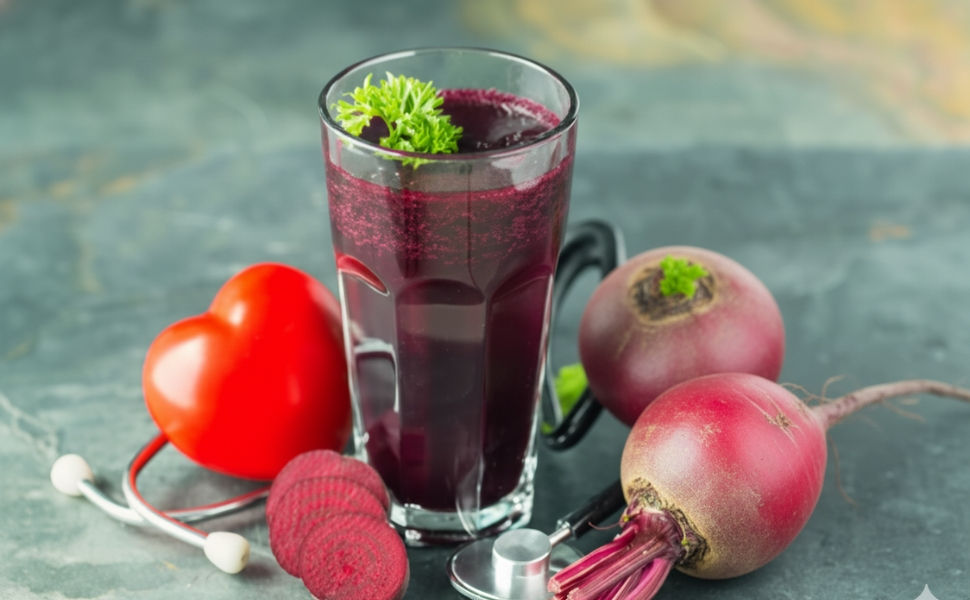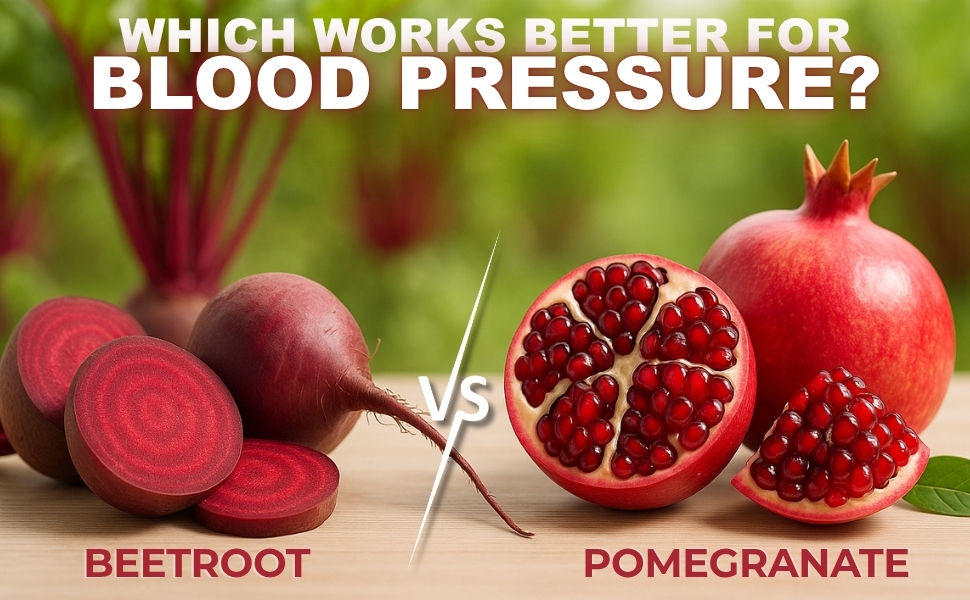Beetroot’s Effects on Blood Pressure: Evidence-Based Benefits
- Herbs around us
- Oct 16, 2025
- 5 min read
Updated: Oct 22, 2025
Beetroot has become one of the most studied vegetables in cardiovascular nutrition — and for good reason. Its naturally high content of dietary nitrates can be converted by the body into nitric oxide (NO), a molecule that helps relax blood vessels and improve circulation.
For people seeking non-drug approaches to support blood pressure balance, beetroot offers a safe, evidence-based solution. This article explores the research behind beetroot’s effects on blood pressure, explains the nitric oxide mechanism, and provides practical tips for safe and effective use.
Direct Answer
Beetroot helps regulate blood pressure by increasing nitric oxide, which relaxes blood vessels, enhances blood flow, and reduces vascular resistance. Clinical studies show that drinking beetroot juice or taking beetroot supplements daily can reduce systolic blood pressure by 4–10 mmHg in both healthy and hypertensive adults.

How Beetroot Lowers Blood Pressure
Beetroot’s blood pressure–lowering effect is primarily due to its inorganic nitrate content. Once consumed, these nitrates are converted by oral bacteria and enzymes into nitric oxide (NO) — a compound that signals blood vessels to dilate, improving circulation and reducing arterial stiffness.
This vasodilation reduces the pressure exerted on artery walls, resulting in more efficient blood flow and lower blood pressure. The process is natural, safe, and supported by decades of vascular physiology research.
A 2015 study published in Hypertension found that participants who consumed 250 ml of beetroot juice daily for four weeks experienced a 7.7 mmHg decrease in systolic blood pressure and improved endothelial function. These results were comparable to some first-line dietary interventions recommended for cardiovascular prevention.
The Role of Nitric Oxide in Cardiovascular Health
Nitric oxide acts as a crucial messenger in maintaining vascular tone, elasticity, and oxygen delivery. It helps the endothelium (the inner lining of blood vessels) stay flexible and prevents excessive constriction.
Low nitric oxide levels are associated with hypertension, atherosclerosis, and reduced blood flow. By providing the dietary nitrates needed to restore NO production, beetroot directly addresses one of the root causes of high blood pressure.
A review in Frontiers in Physiology (2020) emphasized that nitrate-rich vegetables like beetroot can significantly increase plasma nitric oxide concentrations and improve vascular function, even in older adults with mild hypertension.
Scientific Evidence Supporting Beetroot’s Effects
Multiple clinical trials and meta-analyses have confirmed beetroot’s ability to lower blood pressure:
A study in The Journal of Nutrition (2021) reported improved blood vessel dilation and reduced systolic pressure after daily beetroot juice intake.
American Journal of Clinical Nutrition (2018) observed a measurable decrease in both systolic and diastolic pressure in adults consuming nitrate-rich beetroot supplements.
A meta-analysis in Advances in Nutrition (2019) concluded that beetroot juice consistently reduces blood pressure across age groups and health conditions.
Together, these findings demonstrate that beetroot can complement lifestyle-based hypertension management and enhance cardiovascular resilience.
Best Forms of Beetroot for Blood Pressure Support
Beetroot Juice
Fresh or cold-pressed beetroot juice delivers nitrates rapidly into the bloodstream. Studies show that blood nitrate levels rise within 2–3 hours of consumption. Recommended intake: 250–500 ml per day, taken consistently.
Beetroot Powder
Offers a concentrated, stable form of nitrates without added sugars. Recommended serving: 3–5 grams daily, mixed into smoothies or water.
Beetroot Capsules
Ideal for those who prefer convenience or dislike beetroot’s taste. Common dosage: 300–500 mg standardized beetroot extract per day, taken with meals.
Each form provides similar nitric oxide benefits when used regularly. The key is consistency rather than the specific format chosen.
Additional Nutrients Supporting Blood Pressure Regulation
Beyond nitrates, beetroot contains key micronutrients that further aid cardiovascular function:
Potassium – helps balance sodium levels and regulate fluid retention.
Folate (Vitamin B9) – supports red blood cell production and reduces homocysteine levels.
Magnesium – relaxes blood vessel walls and promotes a steady heart rhythm.
Betalains and Polyphenols – provide antioxidant protection that limits oxidative stress on blood vessels.
These compounds act synergistically, amplifying beetroot’s cardiovascular impact through multiple biological pathways.
Recommended Daily Intake and Timing
To achieve measurable blood pressure benefits:
Consume beetroot or its supplement once daily for at least 2–4 weeks.
Optimal dosage:
Juice: 250–500 ml
Powder: 3–5 g
Capsules: 300–500 mg extract
Best timing: morning or 2 hours before physical activity to enhance nitric oxide conversion and circulation.
Consistency matters more than timing — nitric oxide levels gradually build with continued intake.
Safety and Considerations
Beetroot is generally safe, but some people should use caution:
Low blood pressure: Monitor levels if already taking antihypertensive drugs.
Kidney stones: Those sensitive to oxalates should moderate their intake.
Beeturia: Pink or red urine is harmless and temporary.
Always consult a healthcare provider before adding beetroot supplements if you have kidney disease or are on blood pressure medication.
Lifestyle Synergy: Combining Beetroot with Healthy Habits
Beetroot works best when paired with other heart-friendly habits:
Reduce sodium intake.
Increase potassium-rich vegetables and fruits.
Maintain regular physical activity.
Prioritize hydration and stress management.
Beetroot’s nitrate mechanism supports these habits by improving oxygen efficiency and vascular function — amplifying the benefits of an overall healthy lifestyle.
Beetroot’s ability to support blood pressure and heart health is one of the best-documented examples of nutrition meeting science. Through nitric oxide production, this root vegetable helps the body maintain flexible arteries, balanced circulation, and efficient oxygen delivery.
Whether taken as juice, powder, or a capsule, beetroot provides a simple, natural, and research-backed way to promote cardiovascular wellness. With consistent use, it can complement diet and exercise in maintaining healthy blood pressure and long-term heart vitality.
FAQ
Can beetroot really lower blood pressure?
Yes. Clinical studies show beetroot can reduce systolic blood pressure by 4–10 mmHg through nitric oxide–mediated vasodilation.
How long does it take for beetroot to work?
Blood pressure benefits may appear within 2–3 hours after intake, with consistent results after 2–4 weeks of daily use.
Is beetroot better than medication?
No. Beetroot supports healthy blood pressure but should complement, not replace, prescribed treatment.
Should I drink beetroot juice or take capsules?
Both forms are effective. Choose juice for faster results, or capsules/powder for convenience and steady intake.
Is it safe to take beetroot daily?
Yes, moderate daily consumption is safe for most adults. Those with kidney or low blood pressure concerns should consult a doctor.
References
Hypertension (2015). Effects of Beetroot Juice on Blood Pressure and Endothelial Function.
The Journal of Nutrition (2021). Daily Beetroot Juice and Vascular Health Improvement.
Advances in Nutrition (2019). Systematic Review of Beetroot Supplementation and Blood Pressure.
Frontiers in Physiology (2020). Nitrate-Rich Vegetables and Nitric Oxide Pathways in Older Adults.
American Journal of Clinical Nutrition (2018). Beetroot Intake and Blood Pressure Outcomes in Adults.


